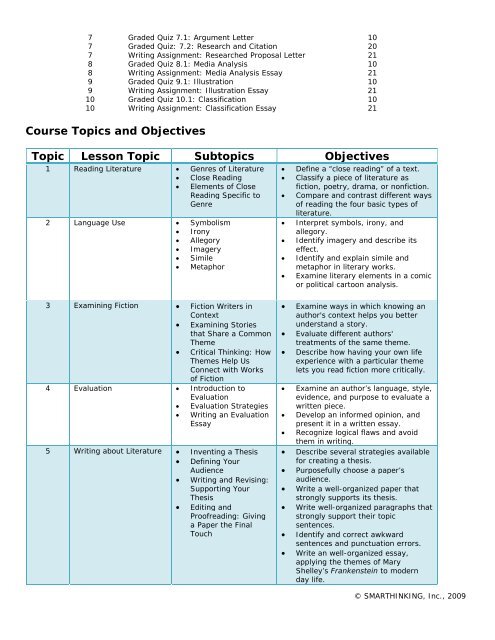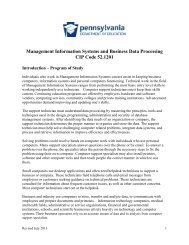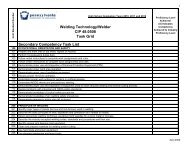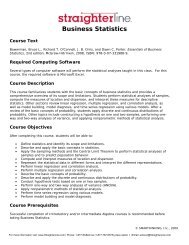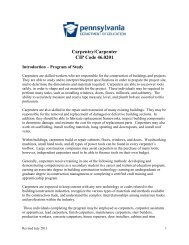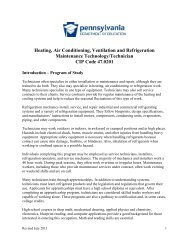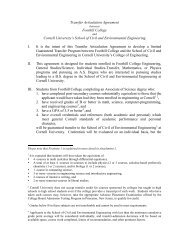English Composition II - CollegeTransfer.net
English Composition II - CollegeTransfer.net
English Composition II - CollegeTransfer.net
Create successful ePaper yourself
Turn your PDF publications into a flip-book with our unique Google optimized e-Paper software.
7 Graded Quiz 7.1: Argument Letter 10<br />
7 Graded Quiz: 7.2: Research and Citation 20<br />
7 Writing Assignment: Researched Proposal Letter 21<br />
8 Graded Quiz 8.1: Media Analysis 10<br />
8 Writing Assignment: Media Analysis Essay 21<br />
9 Graded Quiz 9.1: Illustration 10<br />
9 Writing Assignment: Illustration Essay 21<br />
10 Graded Quiz 10.1: Classification 10<br />
10 Writing Assignment: Classification Essay 21<br />
Course Topics and Objectives<br />
Topic Lesson Topic Subtopics Objectives<br />
1 Reading Literature • Genres of Literature<br />
• Close Reading<br />
• Elements of Close<br />
Reading Specific to<br />
Genre<br />
2 Language Use • Symbolism<br />
• Irony<br />
• Allegory<br />
• Imagery<br />
• Simile<br />
• Metaphor<br />
• Define a “close reading” of a text.<br />
• Classify a piece of literature as<br />
fiction, poetry, drama, or nonfiction.<br />
• Compare and contrast different ways<br />
of reading the four basic types of<br />
literature.<br />
• Interpret symbols, irony, and<br />
allegory.<br />
• Identify imagery and describe its<br />
effect.<br />
• Identify and explain simile and<br />
metaphor in literary works.<br />
• Examine literary elements in a comic<br />
or political cartoon analysis.<br />
3 Examining Fiction • Fiction Writers in<br />
Context<br />
• Examining Stories<br />
that Share a Common<br />
Theme<br />
• Critical Thinking: How<br />
Themes Help Us<br />
Connect with Works<br />
of Fiction<br />
4 Evaluation • Introduction to<br />
Evaluation<br />
• Evaluation Strategies<br />
• Writing an Evaluation<br />
Essay<br />
5 Writing about Literature • Inventing a Thesis<br />
• Defining Your<br />
Audience<br />
• Writing and Revising:<br />
Supporting Your<br />
Thesis<br />
• Editing and<br />
Proofreading: Giving<br />
a Paper the Final<br />
Touch<br />
• Examine ways in which knowing an<br />
author's context helps you better<br />
understand a story.<br />
• Evaluate different authors'<br />
treatments of the same theme.<br />
• Describe how having your own life<br />
experience with a particular theme<br />
lets you read fiction more critically.<br />
• Examine an author’s language, style,<br />
evidence, and purpose to evaluate a<br />
written piece.<br />
• Develop an informed opinion, and<br />
present it in a written essay.<br />
• Recognize logical flaws and avoid<br />
them in writing.<br />
• Describe several strategies available<br />
for creating a thesis.<br />
• Purposefully choose a paper’s<br />
audience.<br />
• Write a well-organized paper that<br />
strongly supports its thesis.<br />
• Write well-organized paragraphs that<br />
strongly support their topic<br />
sentences.<br />
• Identify and correct awkward<br />
sentences and punctuation errors.<br />
• Write an well-organized essay,<br />
applying the themes of Mary<br />
Shelley’s Frankenstein to modern<br />
day life.<br />
© SMARTHINKING, Inc., 2009


